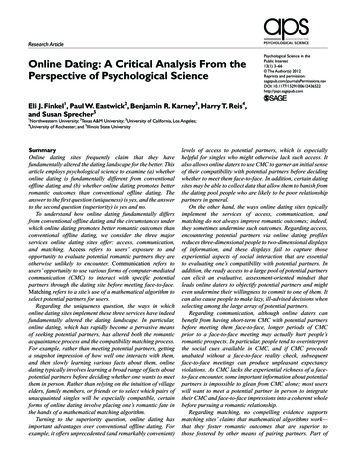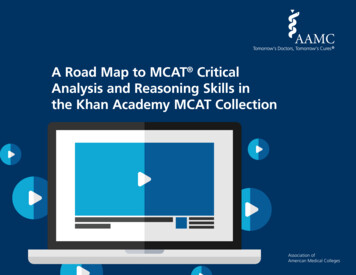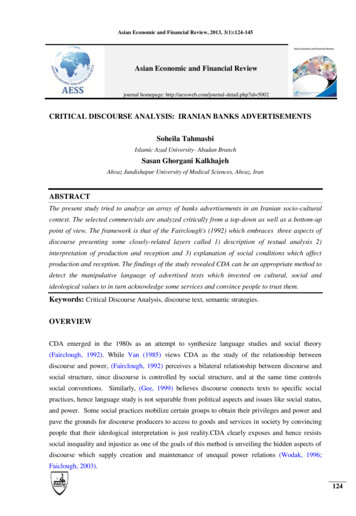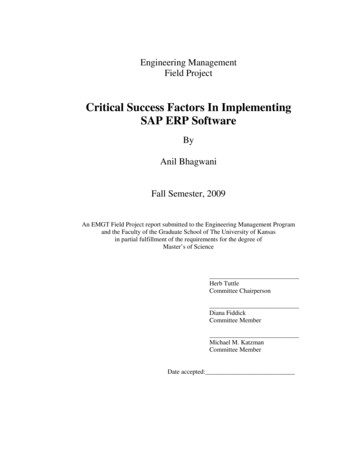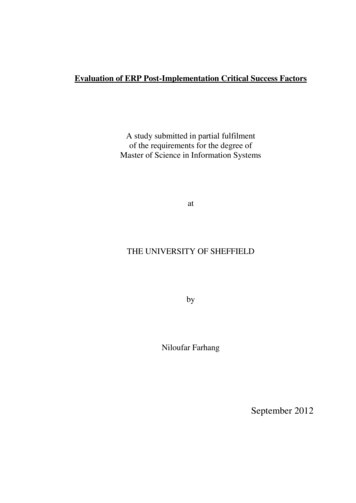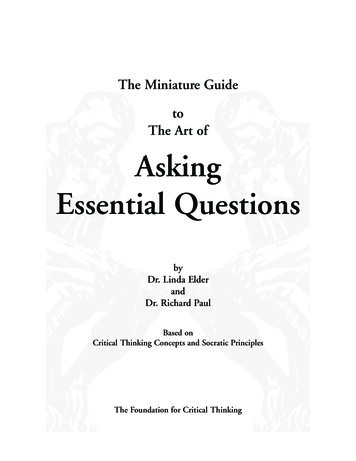
Transcription
International Journal on Studies in English Language and Literature (IJSELL)Volume 5, Issue 4, April 2017, PP 1-11ISSN 2347-3126 (Print) & ISSN 2347-3134 01www.arcjournals.orgA Critical Analysis of the Priest in the Power and the Glory byGraham GreeneMathias Adandé Mehounou, Marcellin Abadame, Gerard AdounsibaBeninAbstract: In this article, I have sought to analyse the character of the whiskey priest in his painful anddesperate quest for repentance. This quest, at first unsatisfied, urges him on fleeing away because of hisrejection of the story of his rejection of the moral values which govern the world in which he lives. The story ofthe whiskey priest in The Power and the Glory can also be seen as the one of a man who suffers like JesusChrist on the Way of the Cross, from human beings and from Nature. The consequence in that he goes through amoral growth in the sense that, in the end, he proves himself to be modest, compassionate in disrupting thelieutenant‟s habitual way of looking at the Catholic clergy.Keywords: Martyr, Roman Catholic Church, whiskey priest, Judas, mestizo, damnation, sinful.1. INTRODUCTIONThe Power and the Glory tells the story of a Roman Catholic priest in the state of Tabasco in Mixicoduring the 1930s a time when the Mexican government, still effectively controlled by Plutarco EliasCalles, strove to suppress the Catholic Church. The persecution was especially severe in the provinceof Tabasco, where the atheist governor Tomàs Garrido Canabal had founded and actively encouragedfascist paramilitary groupe called the” Red-Shirts”The main character in the story is a nameless “whiskey priest”, who combines a geat power for selfdestruction with pitiful craveness, an almost painful penitence and a desperate quest for dignity.2. THE PRIEST’S JOURNEY WITHIN HIS SOULThe story starts with the arrival of the priest in a country town where Catholicism is outlawed, andthen follows him on his trip through Mexico, where he trying to minister to the people as well as hecan. He is also haunted by his personal demons, especially by the fact that he has fathered a child inhis parish some years before. He meets the child, but is unable to feel repentant about what happened.Rather, he feels a deep love for the evil-looking and awkward little girl and decides to do everythingin his power to save her from damnation. The priest‟s opposite player among the clericals is padreJosé; a priest who has been forced to renounce his faith and marry a woman (by order of thegovernment) and lives as a state pensioner.The power and the Glory is not only the story of a priest hunted down by a lieutenant because thestate has decreed so, but also behind all that, there is a profound message which could only be graspedthrough a thematic analysis of the novel that would help to know the character of the priest better.Graham Greene has succeeded in showing that God is God, that is to say, he acts without partiality.Human beings would have expected to see an exemplary priest from a good mileu, but God haschosen.In the power and the Glory, God is everywhere and belongs to everybody although some clergymenare tempted to think and behave as if God were their Thing. The whisky-priest is a case in point whichcannot leave us indifferent. Just at the beginning, there is the will to escape. The very first time we seethe priest is at the harbor, trying to get away. He is referred to as the stranger.At the harbor, the stranger meets Mr. TENCH, a dentist, and they snatch a few minutes conversation.Complaining about the economic situation in the state, Mr TENCH keeps on saying: “God ora pronobis1 ”.1The Power and the Glory, p. 16 ARCPage 1
Mathias Adandé Mehounou et al.He was so proud and so bumptious that he secretly despised the poor. In his life, there was no roomfor sincerity. How it could be when it is obvious that the fear of poverty is what has brought him topriesthood? He had hated poverty like a crime and thought that if he became a priest, he would be richand proud, loving authority? So he had worked it all out. How clever! But can a man cheat with God?His life went on, full of hypocrisy, weakness, lust and love of authority. Out of his pulpit, he used tospeak to people about poverty and misery without knowing what they actually were. He is nowexperiencing what poverty and suffering mean. Since he has no food, no rest, no people aroundhimself, he feels satisfied for he can talk of suffering without hypocrisy. As he puts it himself: “It ishard for the sleek and well-feed priest to praise poverty2“. Even his hands, plump in the old days, havenow changed since “the whole world had changed”.Besides, his regged clothes as well as his hard hands help him avoid being arrested during thelieutenant‟s interrogations at Maria‟s village.“It is an ill-wind that blows pobady any good”. One thing curious is that the mysterious force neverabandons him, it always holds out its hand to save him from early ordeals, preferring to wait for itstime.The priest‟s sufferings are not physical only, they are moral too. Thus, his last visit to Maria‟s villageand his tête-à-tête with Brigitta; his daughter is quite moving. It brings to our mind a similar situationdescribed by the American author Scott FITZGERALD in his short-story: Babylon Revisited. Indeed,both priest can indeed be compared to Charles Wales, the hero of Babylon Revisited. They have adaughter whom they love so much and wish they could do everything for their progeny: Brigitta onthe one hand and Honoria on the other hand. Unfortunately, they can‟t because nature has decidedotherwise.Charlie Wales returns from Babylon (Paris) as disappointed as the priest is when he is compelled togo away, leaving Brigitta to her own destiny. He has come to the fact that one must love every soul asif it were one‟s own child. A new dimension is added to his obscure sense of Christian duty: thepassion to protect must extend itself over a world. The immense load they call-responsibility-has nowrevealed itself to him. His position of incapable father makes him feel ill at ease. He avoids meetingBrigitta‟s gaze, since so many reproaches are fixed on it.All happens as if the priest were being taken to task by his own conscience. As for Brigitta, she wantsresponsibilities to be clearly defined and punishments to fall upon guilty men. Why should she standmockeries from pedro and the other children of the village whereas the person really responsible for“her” deplorable situation is nobody but the priest who, that day, drank Brandy and feeling alone,yielded to temptation? His dialogue with Brigitta filled him with remorse, resentment and selfreproach.He learns a good deal too from Maria, his ex-parishioner and Brigitta‟s mother. But what matters,here, is not the harshness and the cruelty of Maria‟s works as such, but the way the priest accepts herreproaches and her insults. Now that he has become the non-respected man, he has no choice; hisattitude is so humble that it is worth mentioning. Maria says to him, fiercely:“Now perhaps you‟ll go-go away altogether.You are no good anymore to anyone.Don‟t you understand father?We don‟t want you anymore3‟‟But, faced with such a vehement rebuke, the priest remains calm. He merely answers:“Oh yes, I understand. But it‟s not what you want or I want”We clearly see that, once again, the mysterious force is referred to as being unique to decide: “It‟s notwhat you want or I want4‟‟The priest is now quite convinced that he has to obey that force. Next is his encounter with the devoutwoman in prison. The words he exchanges with the woman are full of self-knowledge, humility and234Idem: p. 71Ibid., p. 78Ibid., p. 79International Journal on Studies in English Language and Literature (IJSELL)Page 2
A Critical Analysis of the Priest in the Power and the Glory by Graham Greenewisdom. He doesn‟t claim to be good man at all. He knows well who he is. He says, with humility:“Oh, I am not only a drunkard. I have a child5”He used to be so boastful when people came to him in the past and kissed his black cotton glove. But–now, he no longer is. He is even surprised to see that his heart is now, he no longer is. He is evensurprised to see that his heart is now full of companionship. Life has taught him so much. He knowsfor instance that there is no point in judging our fellows. More and more comprehensive, he invitesthe pious woman not to treat others badly, not to judge them because he knows “from experience howmuch beauty Satan carried sown with him when he fell”.In so behaving, the priest is following Jesus‟ lesson: Do not judge, so that you will not be judged” or“Love each other as I too love you6‟‟His sense of uselessness is so high. He‟s always looking for himself. The more he thinks of all thesacrifices hostages are making to save him, the more useless he feels. He cannot keep exclaiming:“Oh God, send them someone more worthwhile to suffer for7‟‟We notice that between the heroic double he has dreamt of and the character whose part he is actuallyplaying, the gap never ceases to widen: his adventure verges on the grotesque. In his past life, therewas no room for love. But now in corruption, he has learnt to love people. For instance, he doesn'tdislike the lieutenant although he does know he is the one commissioned to lead him to Golgotha. Asthe priest puts it himself, “hate is a failure of imagination8”.Whenever you agree to try and imagine what God is, you are bound to feel pity for human beings.That is why the priest hates nobody and accepts his fellows without much ado. He has discoveredwithout his knowing it, what tolerance and forgiveness are. On point is very important during hisjourney within the discovery of loneliness. In fact, when we see him back at the Fellows‟; we cannotkeep sinking with him in a tense silence, an alarming solitude.All that is now-at the Fellows‟-is the empty house and the crippled bitch. No people, no food, nohiding-place. The whole world has fled. It seems it has been decreed that he should go through everyking of suffering. Thus, the priest is led to experience real tenderness and love. Faced with the littleIndian wounded by the Yankee, again, he doesn‟t hesitate to help. He spontaneously takes off his shirtwhich he tears into strips in order to cur the little creature, a victim of human beings‟ violence. Thepriest has learnt now how to be human and that the secret of happiness is in service to others.Years ago, he couldn‟t have done such a thing. He is ready now, at any time, to diminish himself sothat God‟s glory be always wider and greater. The priest undergoes now a moral growth, and he lookslike the son of God, the Man of sorrows. Although he told the pious woman in prison that he nolonger knows how to repent and how to pray, he wearily goes down on his knees and prays after thedeath of the little Indian. He has learnt a lot about human dignity too. The want of food and excessivehunger lead him to dispute with a bitch over a bone.“No food ever tasted so good”, he appreciates. Such an ironic though coming from the priest‟s mouthreminds us of Gloucester in King Lear. After he is blinded, Gloucester says later:“Full of its seen,Our means secure us and our mere defectsProve our commodities9”.It is true that we only appreciate things conveniently when we are deprived of them. After the priest‟sjourney in the company of the Indian woman, he notices a sudden change in his life and manners. Thelove of authority is back in all his sayings. When he realises such a change in his manners, he feelsashamed. And later, he makes a pitiful self-criticism that discipline is necessary to lead a meaningfullife. He considers himself as undisciplined. Having given up all his duties, he is now complainingabout his negligence, about his surrenders: feast days and days of abstinence.5Ibid., p. 127St. John, 15.127St. John, p. 135689St. John, p. 131King Lear, Act IV, Scl, p. 129International Journal on Studies in English Language and Literature (IJSELL)Page 3
Mathias Adandé Mehounou et al.But we wonder whether it is worth respecting fast days just for the pleasure of pleasure of doing it.Fasting, in our opinion, must have significance. There is no point in fasting just because people do so.All is and worship Him as his heart tells him. The whisky priest seems now to get clearly GrahamGreene‟s conception of God‟s omnipresence when he declares: “we are made in God‟s image. God isthe parent, but he is also the policeman, the criminal, the priest, the maniac and the judge 10‟‟ Each ofus thus does possess the divine substance within, and all that differs is in our apparent aspect, ourbody.We are all, part and parcel of the Almighty. Such a knowledge accounts for the difference amonghuman beings. Such a difference is necessary and, when it is understood, it can only appeal to ourtolerance and no forgiveness, there will not be any religion. Such a tolerance helps us accept ourfellows and connive at by human beings and tries to stick to their qualities only. This enables him torecognize that the lieutenant is not such a bad man.As a matter of fact, he is driven by an obsessive hatred for the Catholic Church, he will stop atnothing to apprehend and execute the priest, who, he believes, is the last remaining clergyman in thestate. The lieutenant is a principled, disciplined man with a strong sense of justice. He is committed topolitical ideals that he thinks will help the poor and create equality and lolerance in the state.Unfortunately, he oftentimes allows his focus on his noble goal. The most striking example of this ishis decision to round up hostages and execute people if the villagers lie to him about the priest‟swhereabouts. As we see, the selection process is entirely arbitrary, hardly, just, and extremely violent.It is easy to see why the church. But even this person is capable of change. From time to timethroughout the novel he shows that h
The consequence in that he goes through a moral growth in the sense that, in the end, he proves himself to be modest, compassionate in disrupting the lieutenant‟s habitual way of looking at the Catholic clergy. Keywords: Martyr, Roman Catholic Church, whiskey priest, Judas, mestizo, damnation, sinful. 1. INTRODUCTION The Power and the Glory tells the story of a Roman Catholic priest in the .
